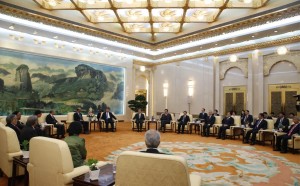By: Charles Ayers
The representatives of 56 different countries gathered in Beijing to inaugurate a new fixture in the global financial structure, the Asian Infrastructure Investment Bank (AIIB). Spearheaded by China, the new organization will utilize first $50 billion, then $100 billion, to provide investment for infrastructure projects throughout Asia. Conspicuously absent from the ceremony was the United States, whose officials have questioned the AIIB’s long term goals and commitment to environmental and labor standards. However, many observers believe that US policymakers are primarily concerned by the prospect of a Chinese-led international bank challenging Western-dominated organizations like the IMF and World Bank.
The United States and Japan, which heads the Asian Development Bank, are the only global economic powers to not join the AIIB. Many of the AIIB’s founding members are longtime US allies, like the United Kingdom, Australia, and South Korea. China is the bank’s largest shareholder, contributing some $29.8 billion; India, the second largest shareholder, has only contributed $8.4 billion. Under the organization’s voting structure, China will control 26.06% of the voting shares, and will likely have an even greater influence over issues of structure and leadership. It is almost certain that the AIIB’s first leader will be Chinese, a former deputy finance minister named Jin Liqun.
Some American officials worry that the AIIB will eventually be run as a de facto component of Chinese foreign policy, as oppose to an impartial international bank. The organization could conceivably serve to steer infrastructure contracts towards Chinese companies, and extort nearby nations desperate for infrastructure investment. Beijing’s mountain of foreign currency reserves is sitting unused, so it makes sense for China to invest in potentially lucrative infrastructure deals; wealthier neighbors will also buy more Chinese goods. At the very least, the AIIB could increase Chinese influence and appeal while serving as a credible alternative to the World Bank or IMF. Some observers also note that the new organization may overlook environmental and labor concerns when completing projects.
However, while the bank may serve to increase Chinese influence and soft power relative to the United State’s, many critics accuse American officials of overreacting to the AIIB’s creation. A wealthier, more connected Asia is good for the global economy in general, and could create new markets for US goods and services. Furthermore, more competition among international financial institutions could improve organizational efficiency and overall development success. It might also force a much-needed discussion about traditional organizations like the IMF and World Bank, in which newly developed nations like China are absurdly underrepresented. Indeed, several commentators, including Ben Bernanke, claimed that the 2010 decision by the US Congress to reject an IMF agreement to reassign voting shares was at least partially responsible to create an alternative organization in the AIIB.
Photo Credit: REUTERS/Takaki Yajima/Poo

